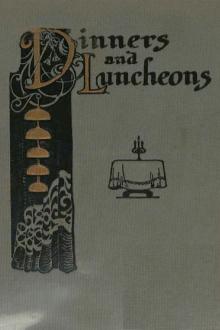Station Life in New Zealand, Lady Mary Anne Barker [read books for money .TXT] 📗

- Author: Lady Mary Anne Barker
Book online «Station Life in New Zealand, Lady Mary Anne Barker [read books for money .TXT] 📗». Author Lady Mary Anne Barker
That its sound shall be death to her foemen,
And make her militia as stoic
As St. George made the Cressy crossbowmen;
A royal device for her banners,
A reverse for her coinage as splendid,
An example of primitive manners
When all their simplicity's ended?
Here it is, ye isles Antipodean!
Leave Britain her great Cappadocian;
I'll chant you a latter-day paean,
And sing you a saint for devotion,
Who on horseback slew also a monster,
Though armed with no sharp lance to stab it,
Though no helmet or hauberk ensconced her,
But only a hat and a habit.
This dame, for her bravery sainted,
Set up for all times' adoration,
With her picture in poetry painted,
Was a lady who lived on a station.
Her days--to proceed with the story
In duties domestic dividing,
But, or else she had never won glory,
She now and then went out a-riding.
It chanced, with two knights at her stirrup,
She swept o'er the grass of the valleys,
Heard the brooks run; and heard the birds chirrup,
When a boar from the flax-bushes sallies.
The cavaliers leaped from their horses;
As for weapons, that day neither bore them;
So they chose from the swift watercourses
Heavy boulders, and held them before them.
They gave one as well to the lady:
She took it, and placed it undaunted
On the pommel, and balanced it steady,
While they searched where the animal haunted.
A bowshot beyond her were riding
The knights, each alert with his missile,
But in doubt where the pig went a-hiding,
For they had not kept sight of his bristle.
When--the tale needs but little enlarging
One turned round by chance on his courser;
To his horror, the monster was charging
At the lady, as if to unhorse her.
But his fears for her safety were idle,
No heart of a hero beat stouter:
She poised the stone, gathered her bridle--
A halo, 'tis said, shone about her.
With his jaws all extended and horrid,
Fierce and foaming, the brute leapt to gore her,
When she dropped the rock full on his forehead,
And lo! he fell dying before her.
There he lay, bristling, tusky, and savage;
Such a mouth, as was long ago written;
Made Calydon lonely with ravage,
By such teeth young Adonis was bitten.
Then praise to our new Atalanta,
Of the chase and of song spoils be brought her,
Whose skill and whose strength did not want a
Meleager to finish the slaughter.
She is sung, and New Zealand shall take her,
Thrice blest to possess such a matron,
And give thanks to its first ballad-maker,
Who found it a saint for a patron.
Letter XXIII: Concerning a great flood.
Broomielaw, February 1868. Since I last wrote to you we have been nearly washed away, by all the creeks and rivers in the country overflowing their banks! Christchurch particularly was in great danger from the chance of the Waimakiriri returning to its old channel, in which case it would sweep away the town. For several hours half the streets were under water, the people going about in boats, and the Avon was spread out like a lake over its banks for miles. The weather had been unusually sultry for some weeks, and during the last five days the heat had been far greater, even in the hills, than anyone could remember. It is often very hot indeed during the mid-day hours in summer, but a hot night is almost unknown; and, at the elevation we live, there are few evenings in the year when a wood-fire is not acceptable after sunset; as for a blanket at night, that is seldom left off even in the plains, and is certainly necessary in the hills. Every one was anxiously looking for rain, as the grass was getting very dry and the creeks low, and people were beginning to talk of an Australian summer and to prophesy dismal things of a drought. On a Sunday night about eleven o'clock we were all sauntering about out of doors, finding it too hot to remain in the verandah; it was useless to think of going to bed; and F---- and Mr. U---- agreed that some great change in the weather was near. There was a strange stillness and oppression in the air; the very animals had not gone to sleep, but all seemed as restless and wakeful as we were. I remember we discussed the probability of a severe earthquake, for the recent wave at St. Thomas's was in everybody's mind. F---- and I had spent a few days in Christchurch the week before. There was a regular low-fever epidemic there, and, he had returned to the station feeling very unwell; but in this country illness is so rare that one almost forgets that such a thing exists, and we both attributed his seediness to the extraordinary heat.
When we were out of doors that Sunday evening, we noticed immense banks and masses of clouds, but they were not in the quarter from whence our usual heavy rain comes; and besides, in New Zealand clouds are more frequently a sign of high wind than of rain. However, about midnight F---- felt so ill that he went in to bed, and we had scarcely got under shelter when, after a very few premonitory drops, the rain came down literally in sheets. Almost from the first F---- spoke of the peculiar and different sound on the roof, but as he had a great deal of fever that night, I was too anxious to notice anything but the welcome fact that the rain had come at last, and too glad to hear it to be critical about the sound it made in falling. I came out to breakfast alone, leaving F---- still ill, but the fever going off. The atmosphere was much lightened, but the rain seemed like a solid wall of water falling fast and furiously; the noise on the wooden roof was so great that we had to shout to each other to make ourselves heard; and when I looked out I was astonished to see the dimensions to which the ponds had. swollen. Down all the hill-sides new creeks and waterfalls had sprung into existence during the night. As soon as I had taken F---- his tea and settled down comfortably to breakfast, I noticed that instead of Mr. U---- looking the picture of bright good-humour, he wore a troubled and anxious countenance. I immediately inquired if he had been out of doors that morning? Yes, he had been to look at the horses in the stable. Well, I did not feel much interest in them, for they were big enough to take care of themselves: so I proceeded to ask if he had chanced to see anything of my fifty young ducks or my numerous broods of chickens. Upon this question Mr. U---- looked still more unhappy and tried to turn the conversation, but my suspicions were aroused and I persisted; so at last he broke to me, with much precaution, that I was absolutely without a duckling or a chicken in the world! They had been drowned in the night, and nothing was to be seen but countless draggled little corpses, what Mr. Mantilini called "moist unpleasant bodies," floating on the pond or whirling in the eddies of the creek. That was not even the worst. Every one of my sitting hens was drowned also, their nests washed away; so were the half-dozen beautiful ducks, with some twelve or fourteen eggs under each. I felt angry with the ducks, and thought they might have at any rate saved their own lives; but nothing could alter the melancholy returns of the missing and dead. My poultry-yard was, for all practical purposes, annihilated, just as it was at its greatest perfection and the pride and joy of my heart. All that day the rain descended steadily in torrents; there was not the slightest break or variation in the downpour: it was as heavy as that of the Jamaica _seasons_ of May and October. F----'s fever left him at the end of twelve hours, and he got up and came into the drawing-room; his first glance out of the window, which commanded a view of the flat for two or three miles, showed him how much the waters had risen since midnight; and he said that in all the years he had known those particular creeks he had never seen them so high: still I thought nothing of it. There was no cessation in the rain for exactly twenty-four hours; but at midnight on Monday, just as poor F---- was getting another attack of fever, it changed into heavy, broken showers, with little pauses of fine drizzle between, and by morning it showed signs of clearing, but continued at intervals till midday. The effect was extraordinary, considering the comparatively short time the real downpour had lasted. The whole flat was under water, the creeks were flooded beyond their banks for half a mile or so on each side, and the river Selwyn, which ran under some hills, bounding our view, was spread out, forming an enormous lake. A very conspicuous object on these opposite hills, which are between three and four miles distant, was a bold cliff known by the name of the "White Rocks," and serving as a landmark to all the countryside: we could hardly believe our eyes when we missed the most prominent of these and could see only a great bare rent in the mountain. The house was quite surrounded by water and stood on a small island; it was impossible even to wade for more than a few yards beyond the dry ground, for the water became quite deep and the current was running fast. F----'s fever lasted its twelve hours; but I began to be fidgety at the state of prostration it left him in, and when Tuesday night brought a third and sharper attack, I determined to make him go to town and see a doctor during his next interval of freedom from it.
Wednesday morning was bright and sunny, but the waters had not much diminished: however, we knew every hour





Comments (0)